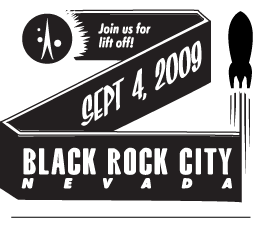“Burning Man’s Backers Take Nonprofit Route”
By JOHN LETZING
The group behind Burning Man, the giant annual arts festival in the Nevada desert, is poised to turn itself into a nonprofit, which the famously quirky operation thinks suits its ethos. Nonprofit status also could help the group better raise and spend funds than the limited-liability corporate setup it now uses.
But creating a nonprofit amid a weak economy may be no picnic. So Burning Man’s organizers say they are taking cues from the lessons learned at the Black Rock Arts Foundation, a San Francisco-based nonprofit adjunct to the festival that was formed in 2001.
For the past 14 years, the Burning Man festival has been managed by a San Francisco legal entity known as Black Rock City LLC. In August—the same month this year’s festival took place with about 50,000 participants in northwestern Nevada—the group announced it would form a nonprofit called Burning Man Project that may become the parent organization of both the annual event and some of its related offshoots.
A nonprofit organization would better gel with Burning Man’s stated principles such as “gifting” and “decommodification,” said Freddy Hahne, an artist who journeys to the festival every year under the pseudonym Dr. Really? and is board president of the Black Rock Arts Foundation.
The Burning Man Project also would be better able to raise money since it could qualify for grants awarded only to nonprofits, and donations to the group would be tax-deductible to the givers, organizers say. Moreover, it would more readily be able to form partnerships, they add.
Having nonprofit status also would shield a group from federal income tax and could be “a reputational enhancement,” said Darryll Jones, an associate dean at Florida A&M University College of Law and an expert on nonprofits and taxes.
The Black Rock Arts Foundation funds the placement of art from the Burning Man festival on city streets and provides grants for new art projects around the world. Funded works include a 40-foot-tall rocket ship on San Francisco’s Embarcadero and an art gallery installed in the rear of a motorized pedicab in Beijing.
The foundation also was formed during an economic downturn, the dot-com bust last decade, and struggled through some uneven fund raising and difficult years. As a result, Burning Man’s organizers say they absorbed real-world schooling on how to build a board of directors, raise money and implement fiscal discipline.
Harley Dubois, a co-founder of the arts foundation who now serves on the boards of the foundation and the Burning Man Project, said the foundation’s experience will be instructive for the Burning Man Project as it forms partnerships and works with public officials. In addition to her board memberships, Ms. Dubois serves as “City Manager” of Black Rock City, the temporary locale that Burning Man attendees conjure on a Nevada playa every year.
The art foundation’s “largest lessons were on running a business entity,” said Ms. Dubois. “We had a hard time getting started, essentially because we didn’t know what we were doing.”
Larry Harvey, who launched Burning Man on San Francisco’s Baker Beach in 1986, helped get the Black Rock Arts Foundation off the ground in 2001 with a $30,000 loan. The group at first lacked expertise in attracting talent and managing its finances, Mr. Hahne recalls.
More trouble arrived with the recession. In 2009, donations to the foundation from “Burners” who purchase tickets to the week-long Burning Man event fell sharply. That year, the foundation reported about $406,000 in revenue, a decline from $439,000 in 2008. Expenses totaled $278,000.
Black Rock Arts Foundation Executive Director Tomas McCabe said the organization responded by cutting over a fifth of its administration costs and holding back on certain projects. Last year, it reported over $478,000 in revenue and nearly $462,000 in expenses as it resumed projects, tax filings show.
The foundation has had many supporters, including Christopher Bently, who operates real estate investment firm Bently Holdings Corp.; Mark Pincus, chief executive of social gaming company Zynga Inc.; and Bob Pittman, a former AOL executive who is CEO of Clear Channel Communications Inc.
Mr. Bently also backs the new Burning Man Project nonprofit. He said the Burning Man Project will help establish more community support for local artists based on the Burning Man ethos, which includes principles such as “communal effort” and “radical self-expression.”





